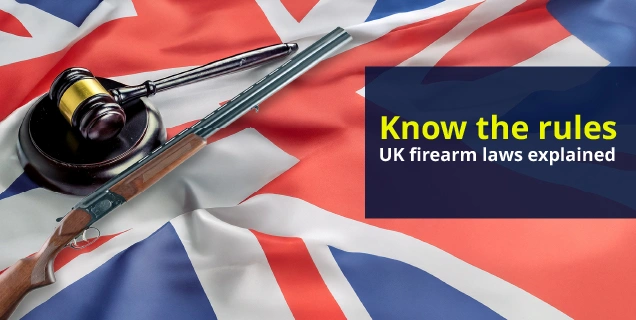UK gun laws explained: What buyers and sellers need to know in 2025
18-Apr-2025

Mark Eves
Navigating the complexities of UK gun laws can be challenging, especially with recent changes and ongoing discussions about firearm regulations. Whether you're a seasoned dealer, an enthusiastic shooter or considering buying or selling a firearm, it's crucial to stay informed about the current legal landscape.
Understanding the UK's firearms licensing system
In the UK, firearm ownership is considered a privilege rather than a right. Access to firearms is tightly regulated, with licensing systems varying slightly across regions:
England and Wales: As of March 2024, there were 147,364 firearm certificates covering 624,245 firearms, and 495,798 shotgun certificates covering 1,345,973 shotguns.
Scotland: 25,145 firearm certificates were issued, covering 110,343 firearms, alongside 43,809 shotgun certificates for 132,323 shotguns.
Northern Ireland: 53,607 firearm certificates were on record.
These figures highlight the structured approach the UK takes towards firearm ownership, ensuring that only qualified individuals possess firearms for legitimate purposes.
Recent legislative changes and their implications
Reclassification of blank-firing guns
In October 2024, the National Crime Agency reclassified certain Turkish-manufactured top/side-venting blank-firing pistols (TVBFs) as Section 5 firearms, making their possession illegal without appropriate licensing. This decision was prompted by incidents where such firearms were converted for criminal use. A national amnesty was held in February 2025, allowing owners to surrender these weapons without facing prosecution.
Potential tightening of shotgun regulations
The UK government is considering aligning shotgun regulations more closely with those for other firearms. This move follows a tragic shooting incident in Plymouth in 2021 and aims to enhance public safety. However, it has sparked concerns among rural communities and farmers, who view it as potentially burdensome.
Guidelines for buyers and sellers
For buyers
Licensing requirements: Ensure you possess a valid firearm or shotgun certificate before purchasing. This certificate specifies the type and quantity of firearms you're permitted to own.
Purchasing process: When buying from a dealer, present your certificate for verification. For private sales, both parties must confirm the validity of the buyer's certificate.
For sellers
Verification: Always verify the buyer's certificate, ensuring it matches the firearm's specifications.
Documentation: Complete the necessary sections on the buyer's certificate and notify the relevant police authority about the transaction.
Emerging concerns: 3D-printed firearms
The rise of 3D printing technology has introduced new challenges in firearm regulation. Blueprints for 3D-printed guns have been found online, prompting legislative efforts to ban their possession and distribution. A bill addressing this issue is currently under consideration in Parliament.
Staying compliant and informed
To ensure compliance with UK firearm laws:
Regularly review regulations: Laws can change; staying updated is essential.
Engage with authorities: Consult local police or licensing bodies for guidance.
Utilise trusted platforms: Websites like Rightgun.uk provide resources and listings that adhere to legal standards.
Final thoughts
Understanding and adhering to UK gun laws is vital for all involved in the firearms community. By staying informed and following proper procedures, buyers and sellers can ensure they operate within the law, contributing to a safe and responsible shooting environment.
Rightgun.uk’s RFD Firearms & Ammunition Register offers dealers a simple, digital solution to manage their records with ease and full compliance. No more paper logs or complicated systems—just smart, secure tracking that saves time and effort.
Create your free account now to explore everything Rightgun.uk has to offer!
Must read:
